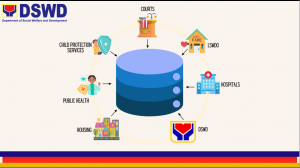
The Department of Social Welfare and Development (DSWD) is embarking on a digital revolution with the planned integration of all its case management systems into a single platform. The project, dubbed the Integrated Electronic Case Management System or IECMS, shall streamline and strategically interconnect the case management processes of the Pantawid Pamilyang Pilipino Program (4Ps), Centers and Residential Care Facilities (CRCFs), Regional Alternative Child Care Office (RACCO), other DSWD programs, and the Local Government Units (LGUs).
IECMS, built on the Primero software platform, serves as a centralized hub designed to enhance the efficiency of the 4Ps and other DSWD programs. It offers a comprehensive case management solution and client data registry encompassing every stage of the case management process, which is both a smoother and faster process for both social workers and beneficiaries. Accessible through computers and mobile devices, the system allows for real-time data access and updates also for government agencies in need of immediate lists of poor or beneficiaries for various government programs.
Addressing Gaps in the Current System.
The Maestral International studies commissioned by UNICEF highlighted the fragment implementation of case management in DSWD. The Department’s service delivery for programs relied on a multitude of independent digital systems that hindered interoperability and data sharing. This approach resulted in delays and inefficiencies, as a holistic view of client needs was often hampered by cumbersome data exchange processes. IECMS addresses this challenge by giving social workers a platform to provide targeted interventions with a comprehensive understanding of each family’s situation.
The need for IECMS is underscored by both the studies done by the inter-Bureau consultations started in 2019 until the end of 2020, as well as the studies made by Maestral International led by De La Salle University. A lack of standardized protocols and the use of incompatible digital systems were identified as key obstacles to efficient service delivery. Further, the absence of clear guidelines even led some LGUs to develop their own processes. IECMS paves the way for a more unified and efficient approach, ensuring consistent service delivery across all DSWD programs and offices.
Project Implementation and Pilot Testing.
The project, supported by UNICEF, is implemented in four phases. The first phase involved mapping existing DSWD systems and processes. The second phase encompasses the software development, while the third phase serves as the pilot implementation. Finally, the fourth phase involves the system’s in-country hosting and maintenance in support of its full implementation.
Beginning March until May 2024, a pilot implementation of the IECMS will be conducted in 15 field offices and selected LGUs to assess its efficiency and effectiveness. The piloting LGUs are Angeles City, Valenzuela City, General Mariano Alvarez in Cavite, Zamboanga City, Lanao del Sur, BARMM, Sablan in Benguet (offline), and at the National Authority for Child Care (NACC). This pilot phase aims to refine the system further before its full-scale implementation across the Department.
The IECMS is envisioned to be the one platform that will connect all programs and services of the social welfare and development sectors and other social protection agencies in the country. With its integration, the DSWD is poised to enhance its service delivery, ensuring that social welfare and development services reach beneficiaries in a more timely and efficient manner.
